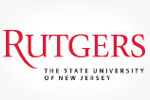Project Profile
Integrative Education and Research on Biointerfacial Engineering
Rutgers University New Brunswick
Abstract
This IGERT program at Rutgers University, focused on integratively engineered biointerfaces, will be an intimately collaborative effort of 32 selected faculty from graduate programs in Molecular Biosciences, Physical Sciences (Physics, Chemistry & Chemical Biology), and Engineering (Biomedical Engineering, Ceramics and Materials Engineering, Chemical and Biochemical Engineering, Mechanical and Aerospace Engineering… more »
This IGERT program at Rutgers University, focused on integratively engineered biointerfaces, will be an intimately collaborative effort of 32 selected faculty from graduate programs in Molecular Biosciences, Physical Sciences (Physics, Chemistry & Chemical Biology), and Engineering (Biomedical Engineering, Ceramics and Materials Engineering, Chemical and Biochemical Engineering, Mechanical and Aerospace Engineering).
Intellectual Merit: The program derives strength from the highly cross-disciplinary nature of over fifteen research project areas identified at the cutting edge of the field of biointerfaces, and programmatic partnerships with five strategic centers of excellence to promote cohesive access for the IGERT community to state-of-the-art research infrastructure. A wide range of thesis project themes is planned for the IGERT trainees, developed around three research and educational thrusts, (1) living cell-based interfaces, (2) microengineered and nanoengineered biointerfaces, (3) biosensing and bioresponsive interfaces. The five major partnering Centers for the IGERT program are: Keck Center for Collaborative Neuroscience, Center for Nanomaterials Research, New Jersey Center for Biomaterials, the Laboratory for Surface Modification, and the Rutgers Center for Computational Design. The educational core of the proposed IGERT program will intimately support the research program, and includes graduate courses in the integrative areas of biointerfacial engineering, as well as course modules on responsible conduct of research, technical communications, entrepreneurship and effective teaching/learning methods.
Broader Impact: The IGERT curriculum is designed to foster a community featuring the next generation of biointerfacial and biomaterials engineers by offering IGERT graduate fellows a range of interactive experiences at multiple levels: multi-disciplinary coursework, lab rotations in two cross-cutting research groups, biannual participation in symposia, and participation in a national/international conference resulting in a white paper. To maximize its impact, the IGERT program will offer varied programmatic pathways to promote diverse modes of professional development of IGERT graduate fellows: (1) Summer research internships at selected international sites for academically inclined students; and (2) Translational research and industrial summer internships for students interested in industrial and entrepreneurial careers. Through a partnership with the Robert Davis Learning Institute of the Rutgers Graduate School of Education Institute, the IGERT program will establish a COLTS (Community of Learners and Thought Shapers) program, inspired by communication-driven cognition models, to encourage IGERT fellows to develop as learners by dynamically communicating their research on integratively engineered biointerfaces.
IGERT is an NSF-wide program intended to meet the challenges of educating U.S. Ph.D. scientists and engineers with the interdisciplinary background, deep knowledge in a chosen discipline, and the technical, professional, and personal skills needed for the career demands of the future. The program is intended to catalyze a cultural change in graduate education by establishing innovative new models for graduate education and training in a fertile environment for collaborative research that transcends traditional disciplinary boundaries. In this sixth year of the program, awards are being made to institutions for programs that collectively span the areas of science and engineering supported by NSF. « less
Contributions[?]
Project members' contributions to the library and showcase are listed here.






